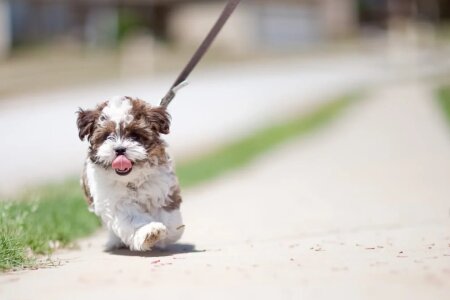Jug (Jack Russell x Pug, Jackpug, Pug Russell)
Overview
The adorable, affectionate, and loyal jug (sometimes called jackpug) is a lively crossbreed between the Jack Russell terrier and pug. These lovable puppies are wonderful companions for families and single owners alike and exhibit many of the features of both the Jack Russell terrier and pug, two very different breeds. Jugs are mostly kept as house pets since they have been bred as designer dogs rather than for utility or farm work, for instance.
Physical Appearance
Jugs are a small-sized breed with a unique appearance. Since Jack Russell terriers and pugs are vastly different in appearance, jugs are a blend of both with some puppies inheriting more of the Jack Russell appearance with longer noses and some resembling more a pug with a cute, squashed face.
They have three different coat types: broken, smooth, or rough. Their coats tend to be rather short, although jugs inheriting more of the Jack Russell’s traits can have slightly longer coats. Common colours include a combination of black, tan, fawn, lemon coloured, and/or brindle.
Some other typical features include a black mask, curly tail, large eyes, and flat ears that point straight ahead of the puppy.
Since the jug is a crossbreed, the breeds most closely related are naturally the Jack Russell terrier and the pug.
How big do jug dogs get?
Height: 25-36 cm
Weight: 5-7 kg
Character Traits
Prospective jug owners will find that this breed is loving, affectionate, and loyal. They tend to inherit the high social features of the pug, but retain some of their territorial and alert nature from the Jack Russell terrier side. They are not known to be aggressive, but they can misbehave or act in a boisterous manner if not well-trained and socialised as puppies.
One of the greatest benefits of a jug is that the breed is highly adaptable to apartment living and can tolerate small spaces in urban environments just as well as in large estates in the countryside. Jugs have high energy and thus need to be exercised fairly regularly, so having a garden or nearby park is always good to keep him (and yourself) active and healthy.
Are jug dogs intelligent? Yes.
Are jug dogs affectionate? Yes, very.
Do jug dogs have high or low energy levels? High energy.
Are jug dogs loyal? Yes.
Are jug dogs playful? Yes.
Are jug dogs aggressive? No.
Are jug dogs easy to train? Yes, very.
Are jug dogs good guard dogs? No, but they are reasonably good watchdogs.
Ability to Socialise
Unfortunately, jugs don’t tend to get along well with other dogs, strangers, or young children. Prospective owners should consider this before purchasing one, although older children won’t pose any problems. They can become territorial and defensive around other dogs and strangers, and when small children are present they can become rather boisterous and possibly hurt them.
Do jug dogs get along with other pets? Not really, they tend to chase small animals.
Do jug dogs get along with other dogs? No.
Are jug dogs good with kids? Not with young children.
Are jug dogs good with strangers? Not really.
Lifestyle Suitability
Jugs are highly adaptable and can settle into a small flat in a busy urban area just as well as in larger environments with gardens. They do have lots of energy and should be exercised every day to keep them stimulated, and due to their fairly high energy levels and separation anxiety, someone should always be home to accompany them.
Owing to their cross with pugs, jugs tend to drool, bark, and shed regularly. They are also better suited to mild climates rather than extreme heat or cold.
Are jug dogs good for first-time owners? Yes.
Are jug dogs hypoallergenic? No.
Are jug dogs prone to drooling? Yes.
Are jug dogs a good breed for apartment living? Yes, they are ideal for apartments.
Do jug dogs shed a lot? Yes.
Do jug dogs bark a lot? Yes, excessive barking is fairly common.
Can jug dogs be left alone at home? Not for extended periods.
Can jug dogs handle the heat? No, not well.
Can jug dogs handle cold temperatures? No, they are sensitive to the cold.
Are jug dogs sensitive to loud noises? Yes.
General Health & Health Issues
Jugs are relatively healthy as a breed, but they are prone to a handful of health concerns that may be hereditary or owing to their cross with Jack Russell terriers and pugs, whereby the jug may inherit some or all of the problems common to either or both breeds.
For these reasons, it’s important to have your veterinarian inspect your jug regularly to diagnose and treat any health problems sooner rather than later, such as:
Cardiomyopathy: a fairly common heart disease that has many symptoms such as breathing difficulties, decreased appetite, or a blue tongue. Can be treated;
Von Willebrand's disease: an inherited bleeding disorder that stems from a lack of specific proteins. Treatment by transfusion is possible;
Brachycephalic airway syndrome: jugs that inherit the squashed face of a pug may encounter difficulties breathing due to their small skulls. Although it cannot be cured, it can be treated to alleviate breathing difficulties;
Hydrocephaly: the leaking of spinal fluids into the skull and brain region is common amongst small and toy dog breeds. Hydrocephaly can be treated provided it is diagnosed early on.
How long do jug dogs live? - 12-15 years
Exercise & Play Time
Jugs have good energy levels and need plenty of stimulation, both mental and physical, in order to keep them happy and healthy. It’s important that you or a family member is always home to keep your jug social and happy, otherwise they may engage in naughty or destructive behaviour, excessive barking, chewing at furniture or shoes, etc.
Since they are bred with Jack Russell terriers, jugs often retain much of their prey drive and will likely chase birds or small pets around. They can often be territorial and defensive around other dogs and strangers, so exercise time outdoors should always be done on a lead.
A morning walk or jog with your pug and perhaps some light play afterwards or spread out into the afternoon or evening will keep your pug busy and tired, and a tired dog is a happy dog.
How much exercise does a jug dog need? - About 30 minutes per day
Do jug dogs like water play? Yes, but they may have difficulty breathing.
Nutrition & Feeding
Try to feed your jug a healthy, high-quality diet as a puppy and into adulthood that consists of plenty of whole proteins, minerals, and vitamins. Overfeeding can quickly lead to obesity, because of their breeding with pugs which makes them prone to putting on weight rather easily.
As jugs grow from puppies into adulthood, make sure you are gradually increasing the quantity of food you’re giving them and that you keep discipline around their feeding schedule to promote healthy adult jugs.
Below are some rough estimates for how much your puppy/adult jug requires, but keep in mind that every dog is unique and thus a personal dietary plan should be prepared.
Are jug dogs prone to weight gain? Yes.
How much should I feed a jug puppy? About 80-100g per day, in three sessions.
How much should I feed an adult jug dog? About 100-180g per day, in total.
Care & Maintenance
Jugs don’t require too much grooming or maintenance, which makes them fairly easy to care for. In terms of emotional support, however, they do not tolerate loneliness very well. In order to improve their temperament as they grow older, it’s important that they’re well socialised as puppies and provided with adequate training.
- Grooming: 2-3 times a week, owners should brush their jug’s fur coat to remove any dead hairs. Jugs shed a lot of hair, which means you’ll have to work hard to keep your home clean. When grooming your jug, check his eyes and ears frequently. Wipe down his eyes if cloudy and clean out his earwax to avoid buildups.
- Emotional care: jugs do not like to be left alone for too long. If left alone for more than a few hours, they may become sad, bored, and destructive. Train them well and with discipline, but not too harsh since they are also sensitive.
History of the Jug
As with many crossbreeds, there isn’t much history around the jug. It is a true crossbreed, meaning that both its parents are pedigree breeds, the Jack Russell terrier and pug. Both of these breeds have long histories dating back centuries, but it was not until perhaps the 1960s that breeders in America began to cross them to breed jugs.
Their purpose is, in all likelihood, purely aesthetic. Although pugs and Jack Russells have been bred for various utility purposes, jugs are not bred to be working dogs, guard dogs, or farm dogs, but instead as house pets and affectionate companions.
The jug is not yet recognised by the Kennel Club, but many associations and societies outside of the UK exist to help inform and share information regarding this lovely breed.
Interesting Facts About Jug Dogs
Jugs have become some of the most popular crossbreeds in the UK in the past decade.
Jugs are most often found here in the UK, but they are extremely popular in the United States, Canada, Australia, and Ireland as well.
Since 2007, it has been illegal to dock the tails of jugs in the UK.
Getting a Jug Puppy
Your heart may jump at the sight of a jug puppy the first time you see one, but take your time and plan your purchase carefully. Owning any pet is a serious responsibility, and prospective jug owners should be aware of the duties and risks associated with purchasing and owning a pet. Our buying guide contains useful information to help you make a more informed purchase.
Puppy mills and unethical breeding practices remain problems here in the UK and elsewhere, so don’t support them and instead purchase a jug only from reputable, reliable breeders.
How much does a jug cost to buy? - About £200-£550.
How much does a jug cost to feed? - An adult jug costs about £0.75-£0.90 per day to feed.
How much does insurance for a jug cost? - About £20-£45 per month.
Sensible alternatives to purchasing a new wheaten puppy include rescue and adoption.
Additional resources can be found via jug registries and associations such as:












